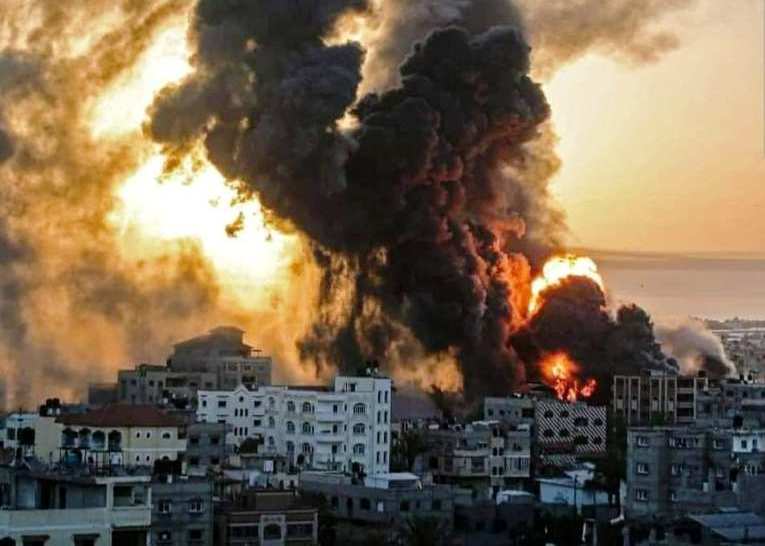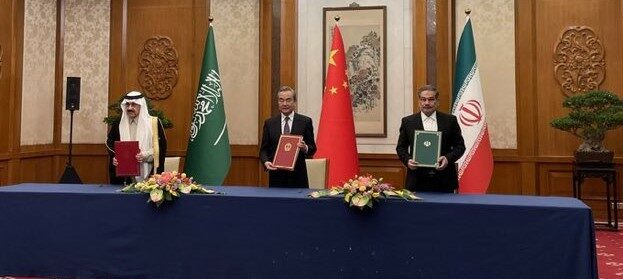by Raashid Andrabi
SRINAGAR: Gaza teetered on the edge of catastrophe as truckloads of aid languished at the Gaza-Egypt border. Desperate residents made pleas on Monday for water, food, and fuel to keep their generators alive. They claimed that the isolated Palestinian enclave, sealed off by Israel in the wake of last week’s upheaval by Hamas, was close to total collapse.

US President Joe Biden is set to travel to Israel on Wednesday, signalling White House support for the nation, and then to Jordan for discussions with Arab leaders. US Secretary of State Antony Blinken disclosed the trip early Tuesday in Tel Aviv, marking his second visit to Israel in less than a week amid concerns that the conflict could escalate into a broader regional crisis.
In Gaza, hospitals stood on the brink of losing power, jeopardising the lives of thousands of patients, while hundreds of thousands of displaced Palestinians scoured for bread. Israel continued its punishing airstrikes across Gaza, with the threat of a ground invasion looming, while Hamas militants continued their rocket attacks, and tensions simmered near the Israel-Lebanon border.
More than a week after Israel cut off the entry of supplies, all eyes were fixed on the Rafah crossing, Gaza’s sole link to Egypt. A lot of relief has been collected near Rafah, on the check post with Egypt. Cairo is keen to open the checkpost for humanitarian relief but not to permit the desperate residents of Gaza to get into Egypt. This, they believe will make them perpetual refugees and the Palestine cause will be lost.
Mediators were working tirelessly to broker a ceasefire that would allow aid to enter and foreigners to leave. Israeli airstrikes had forced the crossing to shut down the previous week, though it remained unclear which of the regional actors was responsible for keeping the crossing sealed.
As of October 17, 2023, the Gaza Health Ministry reported that 2,750 Palestinians have lost their lives, with 9,700 wounded in the ongoing conflict. The Israeli Public Broadcasting Corporation (KAN) stated that at least 1,300 Israelis have died, and over 3,300 have been injured in the current conflict.

Over 400,000 displaced individuals in the south sought shelter in UNRWA’s schools and other facilities. However, the agency was unable to provide them with supplies. UNRWA disclosed having just 1 litre of water per day for each of its staff members trapped in the territory.
“Gaza is running out of water, and Gaza is running out of life,” implored UNRWA chief Philippe Lazzarini, urging the lifting of the siege. “We need this now.”
The few operational bakeries witnessed lengthy queues. Ahmad Salah in the city of Deir al-Balah recounted waiting 10 hours to secure a kilo of bread to feed 20-30 family members.
In northern Gaza, an unknown number of people either remained unwilling or unable to leave.
UNRWA revealed that 170,000 people had taken refuge in its northern schools when the evacuation order was issued, but it couldn’t execute the evacuation and was uncertain if they remained. More than 40,000 people congregated in and around Gaza City’s al-Shifa Hospital, clinging to the hope that it would be shielded from bombardment.
Gaza Facing Waterborne Disease Threat
The United Nations expressed apprehension regarding the potential outbreak of waterborne diseases in Gaza. UNRWA released a statement, stating, “Concerns over dehydration and waterborne diseases are high, given the collapse of water and sanitation services, including the shutdown of Gaza’s last operational seawater desalination plant.”

It is noted that parts of southern Gaza had received water for only three hours on Tuesday.
Iran Issues Warning
Iran has issued a warning of a potential “preemptive” action against Israel “in the coming hours” as Israel readies for a ground offensive in the Gaza Strip.
The Iran-backed Lebanese group Hezbollah and Israel have been exchanging fire along the Lebanese-Israeli border for several days, further escalating tensions as Israel bombards the Gaza Strip to the south following an unprecedented attack by Hamas inside Israel last week.

Iranian Foreign Minister Hossein Amirabdollahian said, “All possible options and scenarios are there for Hezbollah… Naturally, resistance leaders will not allow the Zionist regime to take any action in Gaza, and when it feels reassured about Gaza, move on to other resistance areas in the region.”
Amirabdollahian also emphasised that “the resistance leaders” would not permit Israel “to do whatever it wants in Gaza.”
“If we don’t defend Gaza today, tomorrow we have to defend against these [phosphorus] bombs in the children’s hospital of our own country,” he added, referencing allegations by human rights groups that Israel used phosphorus bombs in its aerial bombardment of Gaza, which Israel has denied.
While Iran celebrated the Hamas assault, it asserted that it had not played a direct role in it.
Amid Israel’s preparations for a ground invasion into the Gaza Strip, fears for the welfare of Palestinians trapped in the heavily bombarded enclave have escalated since the initiation of Israel’s aerial campaign.















